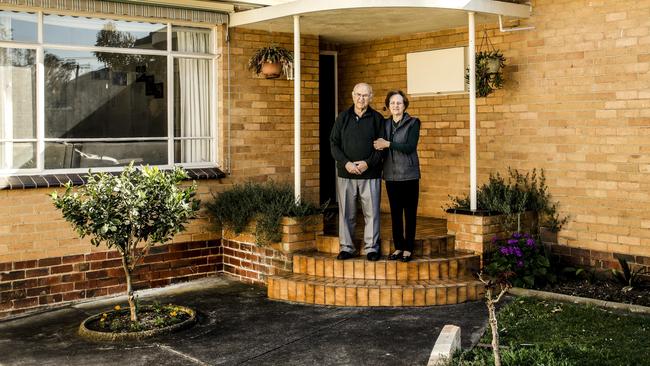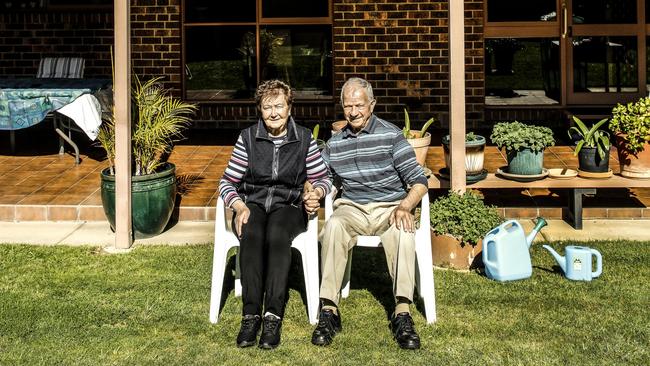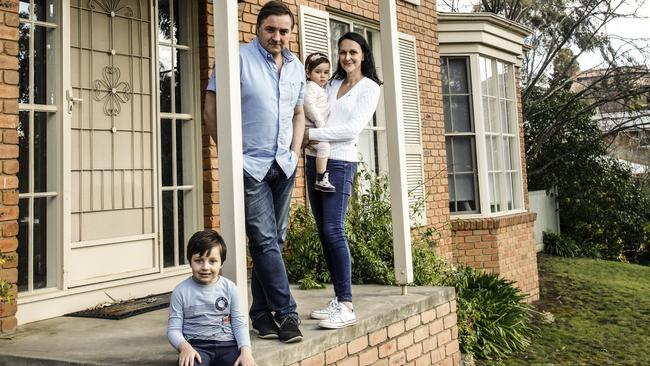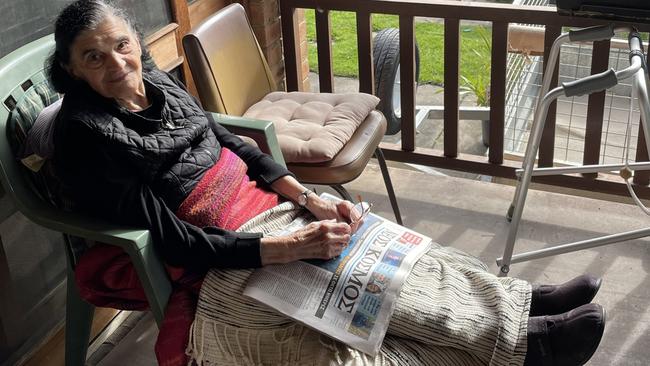Greek-born Aussies are superior beings according to science
Holding onto traditions, like those of Australian migrant groups, extends your life and circle.

Holding onto traditions, like those of Australian migrant groups, extends your life and circle.
"I have two lives," says 84-year-old Jim Stratos as he sits at his kitchen table under a photo of the small Greek village where he was born. “Outside this house, it is 100% Aussie. Inside this house, I am 100% Greek.”
His wife Georgia laughs and adds: “Everything is Greek in here. We talk Greek, we eat Greek, the music is Greek, we dance Greek.”
I try to interject but Jim and Georgia Stratos, first-generation Greek immigrants who arrived in Melbourne in 1952 and 1978 respectively, are on a roll.

“I’m living a long time because my wife is an excellent cook, we use olive oil, we eat fish with lemon, we eat moussaka, spanakopita, lamb on a spit,” says Jim. Georgia cuts him off and points towards her lush vegetable garden in the backyard of their North Balwyn home. “Out there we grow everything – tomato, zucchini, cucumber, broad beans, potatoes, everything. It has always been that way.”
Says Jim: “When I first came here, Aussie food was very, very boring – bacon and eggs, steak and eggs, not healthy, not much good.” Georgia, 67, pulls him up: “But you like Four ’n Twenty meat pies,” she says. “OK, I like the pies,” Jim reluctantly concedes, “but Greek food is much better.”
There are few other migrant groups in Australia that have held on to their traditions so doggedly and for so long as the huge wave of Greeks who came to Australia, and especially to Melbourne, in the postwar years.
That Greek-born generation is getting on now, most of them well into their '70s and '80s. But you can still spot them in suburban front yards all over Melbourne, the women often dressed in black with gnarled hands, bent over as they lovingly tend their vegetable patches and lemon trees.
There is another reason you still see them so often despite their advancing age.
These original Greek Australians are the miracle migrants, enjoying a life expectancy that is not only greater than that of other Australians, but also one of the highest in the world.
And what makes their longevity even more mysterious is that this group is not – at least on paper – a picture of health. They have a higher prevalence of cardiovascular risk factors such as obesity, diabetes and high blood pressure than the general population and yet studies show these first-generation Greeks have around 35% lower mortality rate than locally born Australians and other migrant groups.
“We call it the Greek Paradox,’ says Dr Tania Thodis, a dietitian who has recently written a PhD on the longevity of Greek immigrants. “More than 40 years since they migrated, these original Greek migrants still live longer and have lower mortality than the Australian born and other ethnicities,” she says. “Unlike other migrant groups in Australia, first-generation Greek migrants continue to demonstrate a lower mortality ratio compared with the Australian-born population, according to data in 2004, 2010 and most recently in 2018.”
In 2017, Greek-born Australians had a median age at death of 83.4 years compared with 81.4 for Australians born here, while enjoying a significantly lower mortality rate from all major diseases.
Thodis is the latest researcher to try to answer the mystery that has hovered over first-generation Greek migrants in Australia for decades: what is their secret to a long and healthy life?
In the 1980s, when Australian researchers first examined anecdotal evidence that Greek Australians were living longer, they were stunned to find that the data indicated they were the second longest-lived population in the world behind Japanese immigrants in Hawaii.
It showed that these Greek-born Australians were even outliving their counterparts back in Greece. There have been no recent studies to suggest that this has changed.
“They had a very big mortality advantage against heart disease and cancer, despite having the highest prevalence of obesity, heart disease and blood pressure, and we thought, ‘What’s going on here?’ says Associate Professor Antigone Kouris-Blazos from La Trobe University, who was one of the first Australians to research the phenomenon.
In their search for answers, researchers such as Kouris-Blazos, Professor Catherine Itsiopoulos from Melbourne’s RMIT University and Thodis have tried to work out what differentiates this cohort from the rest of the country.
“Olive oil is the reason why we are still here,” says 75-year old Helen Zafirakos as she sits with her 84-year-old husband Theo near the vegetable patch in the backyard of their home in Vermont South, in Melbourne’s east. “When I came to Australia from Greece, Australians always used butter. I never liked butter,” she says.

Helen and Theo emigrated in the early 1960s and lived the hard-scrabble life of so many Greeks who came here for better opportunities in the 1950s, ’60s and ’70s.
The postwar boom saw the number of Greek-born immigrants in Australia peak at 160,000 in 1971 compared with about 94,000 today, although about 400,000 Australians have some form of Greek heritage.
"I wouldn’t change the Greek kitchen for anything," Theo Zafirakos says.
Theo was 27 when he arrived and trained himself as a fitter and turner while Helen, who came to Melbourne when she was 18, worked in a chocolate factory and then a sock factory as the young couple tried to make ends meet and raise their two children.
Eventually they ran a milk bar together. But throughout their lives, they have strictly maintained their traditional lifestyle, diet and attitudes. “When I came to Australia I would walk past restaurants in Melbourne and I didn’t like the smell of Australian food,” says Theo. “So we decided to do all our cooking at home because you knew what you were eating. We couldn’t afford to buy much meat so we grew our own beans and vegetables and things like that. There are always greens on the table. I wouldn’t change the Greek kitchen for anything.”
Thodis says these migrants lived “in a bit of a bubble, like a time warp” in Australia, holding on to traditions more doggedly than their compatriots back home. “Greek migrants to Australia reverted back to their traditions strongly and they are ageing better,” says Thodis. “After 50 years many of them have kept their Mediterranean diet, they have vegetable gardens, they get together and socialise, often around food.” Because these original migrants were mostly from rural areas or islands, they came to Australia and replicated their small village existence. There have been no studies on whether their children have strongly maintained their traditions, but anecdotal evidence suggests that while they are naturally more assimilated into Australian food and culture than their parents, many are still fluent in Greek, send their kids to Greek school and favour a Mediterranean-style diet.
Jim and Georgia’s daughter Vanessa Nannos, 42, says she is a hybrid of her parents’ “ancient Greek traditions” and Australia. “I am torn between two cultures,” she says. “We are Australians absolutely, the best country in the world, but we have a Greek background and I had a beautiful upbringing surrounded by my [Greek] family and I am trying to teach my children that.” She married a Greek husband, Chris, and takes her four-year-old son James to Greek school. Vanessa says she still fasts ahead of Easter. She, James and her 19-month-old daughter Olivia watch Greek nursery rhymes on TV and she says they plan to plant a vegetable patch next month so that their kids “can learn and understand where our food comes from”.
“I try to cook Greek as much as I can but our diet is a bit of everything. We also have stir-fry,” she admits sheepishly.

When I was in high school in the late 1970s
My parents moved to inner city Richmond, which was then the epicentre of Melbourne’s Greek community, the second largest in the world behind Athens.
In our street, we were the only Australian family. Every other resident in the street was Greek and only their children had mastered English. We were welcomed by our neighbours with open arms that were quite literally laden with gifts ranging from exotic Greek pastries and cakes to every form of fruit and vegetables and sometimes retsina wine.
I would hang out with my Greek mates in the ’hood, who taught me the Greek greetings as well as the swear words. Everyone’s front yard was a very Greek mix of vegetable gardens and lots of concrete – they had little regard for grass or for the aesthetics of Victorian architecture but lots of regard for food, wine, family gatherings and music. It was a fun place to live. It heaved with life. Many worked shifts in the local factories next to Richmond train station. My friends’ parents often worked two or three jobs to make ends meet. Every second taxi driver in Melbourne in those days seemed to be Greek.
Richmond was in the heart of Australia’s second largest city but it was a living, breathing slice of Greece as the first-generation immigrants replicated their lives back home and held on to their traditions with ferocious pride. Now Richmond has been gentrified by inner-city white-collar Australians and the original Greek community is scattered across the city, but they have still held on to their culture.
Thodis’s 2019 PhD research found that 75% of first-generation Greek migrants were keeping a vegetable garden into their eighties, while 90 per cent were still going to church and practising religious fasting. While lifestyle issues have played a part in the longevity of Greek Australians, researchers have focused mostly on their healthy plant-based diet to explain why so many are still with us.
“We hypothesised that their Mediterranean diet was protecting them,” says Kouris-Blazos, whose research found that 80% of Greek-born Australians followed a Greek Mediterranean diet compared with only 57% of Greeks in Greece.
The so-called Greek-Australian Mediterranean diet, which is these days celebrated in numerous cookbooks, uses traditional foods such as legumes, wild greens, tomatoes, garlic, onion, fruits, fish, seafood, olive oil, olives, nuts, feta cheese, yoghurt, wine and herbs.
Religious fasting, which is still widely practised by first-generation Greeks, effectively involves vegan eating (no meat or dairy) for between 40 and 100 days a year.
The American Heart Association says regular fasting is linked to lower rates of heart failure and improved metabolism, promoting the chance of living a long and healthy life.
Greek cuisine is naturally high in antioxidants, with studies showing it has numerous health benefits including helping prevent gut diseases and strengthening immunity.
“There is something about the way they eat that helps them get away with risk factors,” says Thodis. “They are not healthier – they still have higher rates of diabetes, blood pressure, heart disease etc but somehow they still get away with it and end up living longer. Maybe it is something to do with gut microbiomes because they are eating a lot of fibre.”
Of course, the Greeks are not the only ones following a Mediterranean-style diet.
The large numbers of Italians who migrated to Australia during the postwar years also adhered to an Italian version of a Mediterranean diet, eating largely vegetable-based meals cooked in olive oil.
Italian-born migrants enjoy a lower mortality rate than Australians but have a higher rate than that of Greek-born migrants.
Yet it was Italian food rather than Greek food that caught on and became famous in Australia, with pizza and pasta entering into mainstream cuisine in a way that moussaka and spanakopita did not.
Thodis says the Mediterranean diet of Greek migrants is about much more than the food itself.
“The Mediterranean diet [also] encompasses practices and traditions related to how food is procured, processed and prepared as well as promoting social interactions, traditional culture and associated rituals,” she says.
“I wanted to keep the Greek life when I came here,” says 94-year-old Yiannoula Darmos as she sits on the back porch at her Box Hill home with a Greek language newspaper on her lap. “Whatever I did in Greece I did here.” Darmos is dressed in mourning black to honour her late husband Andrew who died five years ago at 96, an age she describes as “not particularly old”.
She and her husband and their three young children came from their small Greek village to Melbourne in 1963 in search of a better life. She got a job sewing in a factory while Andrew worked as a labourer, often working three jobs around the clock. But when they were all at home together in their first house in Richmond they were both determined to remain as Greek as possible.

“The Greeks who came here were more Greek than those in Greece,” says Darmos’s daughter Elini. “[Mum] has never cooked an Australian meal. It was through food that things were celebrated in our family. We always ate at home, I can’t remember having a takeaway meal once in my childhood.” Elini, 59, says she has increasingly embraced her mother’s lifestyle as she gets older. “When I was growing up I tried to be less Greek but I am now more Greek than I have ever been,” she says. “I go back to Greece every two years and I cook more Greek food than ever.”
“Vegetables and not much meat is what we ate,” says Darmos.
“We planted things according to the seasons and kept all the food very simple,” she says, adding that the dinnertime menu was not unlike the food she grew up eating back home in Greece.
Indeed, Darmos’s backyard would not look out of place in her former Peloponnese village, with her three chickens lazily scratching around a large vegie patch and a lemon tree. Asked why she feels she has enjoyed such a long life, Darmos talks about healthy, fresh Greek food and the need to avoid “boring” Australian fare. But she believes attitude is also important. “Having a quiet life that is not full of anger, arguments and worry,” she says.
Part of this recipe for a longer, healthier life, according to these first-generation Greeks, is that the family must eat the evening meal together at the table. They are horrified at the habit many Australians have of eating dinner while they watch TV. What’s the point of good food if you can’t eat it while talking with others, they say.
“We always eat at the table, of course,” says Jimmy Stratos, who is puzzled to think that some people don’t.
“It is the centre of life. Here we talk, we fight, whatever, but we all do it together.” Sitting next to him, his friend Nikki Ayfantas agrees. “You must always eat at the table,” she says, thumping her fist on Jim’s dining room table to emphasise the point.
Ayfantas, 81, has dropped into Jim’s house to tell me that she grew up in the same small Greek village as Jim before emigrating to Melbourne in 1961, where she raised two children with her late husband. “I also kept the [Greek] traditions going,” she says. “Why wouldn’t I?”
Like many of their generation, it is the Greek women who did most of the cooking and who can therefore take most credit for the fact that so many are still alive.
Jim’s wife Georgia says she has never needed a recipe book. “The recipe for everything is up here, in the brain,” she says, tapping her head.
Thodis says the original Greek immigrants stuck to their traditional foods by necessity as well as by choice because many of them were poor and struggled to make ends meet in their early days in Australia. “They didn’t do it because it was healthy, they did it out of need,” she says.
“We couldn’t afford to buy meat all the time,” says 84-year-old Theo Zafirakos. “So we had vegetables and beans and other things instead.” He believes Greeks in Australia are healthier than Greeks back in Greece. “Many of my friends there [in Greece] still smoke,” he says. “When I tell them that you can’t smoke in restaurants or shopping centres in Australia they are shocked, they reckon I am bullshitting.”
Thodis believes that a sense of puffed-up pride in their Greek heritage has also made many of the first-generation Greeks wary of fully embracing the Australian lifestyle. “They are very proud, maybe even a bit egotistical about it,” she says, laughing. “It’s a bit like, ‘Ours is better than yours’.”
Theo agrees: “I love to live in Australia because I can live here but still live like a Greek.” Yet even the original Australian Greeks cannot live forever. Thodis admits that as the years roll on there is now “a diminishing window of opportunity” to examine the “unexplored characteristics” among Australia’s elderly Greek-born migrants.
As the former factory worker Helen Zafirakos places Greek cakes and thick Greek coffee in front of me, she rethinks her answer to my question about why the original Greeks have lived such long and healthy lives in their adopted Australia.
“Maybe it is not the food,” she says with a grin. “Maybe it is laughing. Laughing is always the best medicine.”



